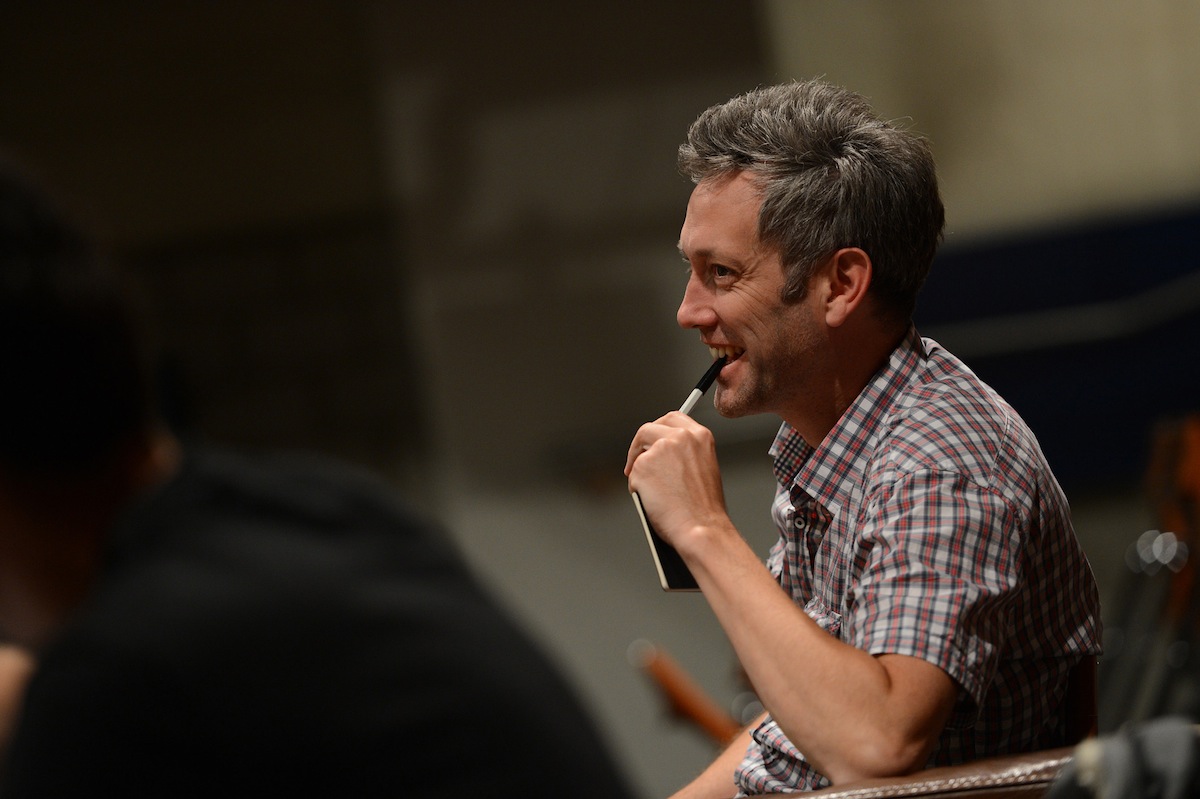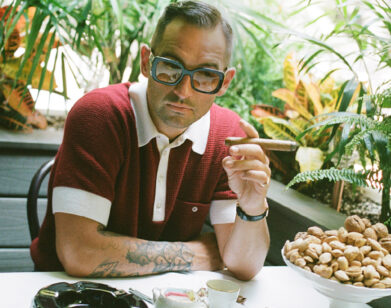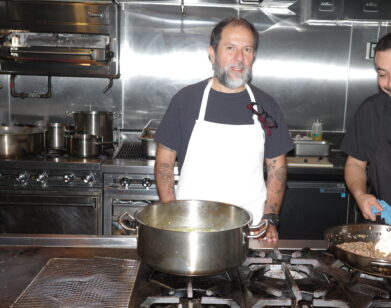What’s New: Isolde, Again

ABOVE: RICHARD MAXWELL. PHOTO COURTESY OF JURI JUNKOV
What would you do if you lost your memory? How would your life and relationships change if access to the standing record of you was abruptly limited without warning or consent? Such is the catalytic crisis of Isolde, the new play by lauded experimental director and playwright Richard Maxwell, whose title character, an actress, tries to remedy her inability to remember her life and lines by building a “dream house.”
Maxwell’s play is based, in part, on the centuries-old legend of Tristan and Isolde, which tells the tale of a woman, betrothed to a king, who consumes the love potion meant for her wedding night and instead falls in love with the captor meant to deliver her. In Maxwell’s Isolde, the fable’s love triangle is mirrored through the dynamics between Isolde, her husband Patrick, who owns a construction company, and the architect they hire to realize their plan, Massimo.
Maxwell seems to explore the psychic entanglements of love and loss—of memory and attachment—and the abstract missions we assign ourselves to construct perfect and lasting things: marriages and homes. Despite these resonant themes, emotional detachment is commonly perceived as a hallmark of the director’s work. On the eve of the North American debut of Isolde, Maxwell took some time to chat with us about the development of the play, and how he identifies connection in the work.
RYANN DONNELLY: What inspired you to write a piece of contemporary theater based on the story of Tristan and Isolde?
RICHARD MAXWELL: It was a total accident, as far as I know. It was determined by my sub-conscious. I wrote a play that involved a love triangle before I knew anything about Tristan and Isolde. And, then I had a dream, and in the dream the title came to me: Isolde. So, I went and looked it up, and I saw these parallels. If I came across it before, I don’t remember it. It just became a sort of—it became compelling to me. My original impulse started with the idea of having a character who is an actress who was having trouble remembering her lines. That, coupled with a couple trying to realize a “dream home”—those two things fused together in my mind, and that’s where it began.
DONNELLY: Did the script change after you familiarized yourself with the original story of Tristan and Isolde?
MAXWELL: Yeah, I made myself available to connections—to the [Richard] Wagner [opera] anyway. And, to other variations, because it goes back before that. I think it’s an old Celtic tale.
DONNELLY: Since Wagner’s Tristan and Isolde is an opera, and you also make music, did you consider adding music?
MAXWELL: We premiered the show at Theater Basel in September, and that production had a couple different performers involved—an opera singer and an actor from their ensemble. And what I did there was split the part of Isolde up into three. Every night it was shared. To me, it was a practical way of collaborating with Theater Basel. In that production, we had a composer, Daniel Ott, who wrote some music. Usually I write music for my shows. I wrote a couple songs, and it was a nice collaboration. But before Basel I had already done an informal workshop presentation [of Isolde] without music, and I felt like it was really interesting to me as a straight play. I got into the craft of playwriting, I guess—asking how it stands on its own legs, without the support of music. And, maybe let the language be the music in the room. So, that’s what happened, and we’re showing at the Abrons Arts Center, which is an old theater—very traditional, proscenium stage. A lot of this play speaks to theater, itself, on top of the Tristan and Isolde storyline. I think there’s always this notion of, “What is theater, and what is its value?” And, there’s the fact that Isolde is an actress too, of course.
DONNELLY: Where have you set the story?
MAXWELL: It’s something I try to avoid being too specific about in my plays. I go for this kind of “everywhere and nowhere” idea. We know we’re in America somewhere, because of the accents, and words we use, and some of the references. Like, I mention a Home Depot store. But I like leaving that to the imagination of the audience: where this could be. You know its somewhere that’s affluent. If you’re going to have a couple that’s trying to realize a “dream house,” then you can have a certain place in mind, or kind of place in mind, and that’s enough.
DONNELLY: How did you arrive at that idea of building a “dream house” as Isolde’s way of escaping her problems with memory?
MAXWELL: I’d like to start with the concept of “dream house.” It seems to suggest: perfect. There’s something perfect about it. To me, that’s compelling. What would it take? We all have our tastes and preferences. But, especially if you take it to an architect, you have to consider the environment around where that will go, and how to employ and involve the natural surroundings, including the materials that get chosen. Just thinking about what is found, architecturally, from the get-go; starting from a firm base, and building from that. What would that house look like? That’s Isolde’s concern. She believes that it is possible to realize this. We learn that up top. It’s interesting that if you’re going to think like this, or embark on an endeavor like this, you can’t ignore time, either. Because what’s perfect now, might not be so 10 years hence. So there’s this involvement of time and nature, which feeds the conversation around memory too. Whatever we’re basing our design ideas on is not what we remember in the past. It’s something that kind of folds in on itself.
DONNELLY: Do you think of a particular image when you personally think of a “dream house”?
MAXWELL: I think about natural materials. I think about stone and wood. I think about what could be efficient, in terms of the ecological aspect of it. What would allow the home to maintain a comfortable temperature without much, or any, effort. These materials like stone allow that to be feasible. It’s still kind of deliberately vague or open-ended. I found when I was writing it, if I got too particular, and said, “the wood is reclaimed chestnut,” for example, that’s almost too specific—too telling or something. So, it’s a fine line I’m trying to walk here.
DONNELLY: Your characters often seem rather detached. Isolde’s memory wanes, which is in itself a kind of detachment from her craft, and identity as a performer. Can you talk about that detachment or loss of connection?
MAXWELL: I guess in the past my conversations with actors have been primarily about what the tasks are. And there really aren’t that many, when you think about it—the brass tacks. You have lines, you have movements, and if these are scored, you’re going to be listening, hopefully, and presenting the story. You’re never really obliged to pretend to be what you might imagine the character to be. Working with these four actors that I’ve worked with a lot, that conversation started to feel a little wrote. If you’re looking for like, a pure base for your behavior on stage, maybe it’s better to say, “Yeah, you’re not obliged to pretend. But, you’re also obliged to not pretend.” So you have access to both sides, if you will. It’s never a pure binary thing, but you can pretend. If you have total agency as a performer, then both are at your disposal.
I like that idea, and I like how that ties to this writing, which, in Isolde is more fleshed out, psychologically. It feels like people looking at, and talking to each other, having a conversation in rooms. Like, that’s kind of what your more conventional theater has, right? This kind of behavior, or this agency seems to go with the text more. I like what you’re saying about the connection to identity. For someone like Isolde, who’s an actress trying to remember—not just her lines, but her past—as a way of being convincing on stage, that’s something that’s coming undone, and perhaps why she feels this desire to realize a dream house, to get rooted in something again. I was just thinking about a line from the play. Massimo is the architect they hire. He presents his idea, and Isolde is very excited about it, and she says she’s impressed with how you can have something that points to the future and the past—a place—that points to the future and the past. When you said “connection,” that was something that came to mind.
DONNELLY: How has collaborating with actors you’ve worked with for several years affected the work?
MAXWELL: There’s more trust. The conversation changes. There’s less that needs to be said, I guess. I find that I’m taking more suggestions from them than I normally would. That’s just not something you can buy. It comes from an accumulation of years.
DONNELLY: Do you identify any particular growth or change from past work?
MAXWELL: Growth with this show might be best measured with regard to my identity when I made my last show, Neutral Hero. I was recognizing that I had reached the end of a phase that had been largely defined and categorized by other people, and this response—making Neutral Hero—was also the furthest I could go with an idea of presenting neutrality. Ironically or paradoxically, I found with that show I was going more and more into my own past to define what was neutral—in short, in defining the neutral I couldn’t come up with anything better than finding what was natural, theatrically speaking. So, maybe I inadvertently opened up a passage toward Isolde, accepting natural as a logical progression, or even a rite of passage.
DONNELLY: I was also curious about the video interview you did earlier this month with Elizabeth Lecompte of The Wooster Group. You asked her for notes. Did you implement anything from that conversation?
MAXWELL: I did get some good notes from Liz despite her objections. She had some thoughts about Tory [Vazquez] and Gary [Wilmes] in the play. Her sense was that Gary might be holding back in some scenes with Tory because Tory is my wife, and that Tory needed to step on the gas a little bit in response to all the male posturing in the play. Some of that burden I tried to take off of the actors by making small changes in the writing.
DONNELLY: On the New York City Players site, it says that the work is about people, relationships, and above all feeling. Is there a particular feeling you’re hoping this work evokes?
MAXWELL: In terms of that quote, the feeling is left open. I wrote that sort of as a response to people characterizing the work, not just being detached, but as having a lack of feeling or a lack of emotions, I guess. And, I remember thinking, “Why is that?” I guess I put so much trust into my audience. I really believe in audiences in a collective sense. And the feeling is for them. It’s not really for us. I may have felt something when I wrote what I wrote. But that time is gone. And, the actor may have felt something in rehearsal. But, that’s gone too. But the only thing that’s really left is the feeling that might happen for the audience in the room. And I really like that idea, that they might complete the equation.
DONNELLY: What would you make or do if your memory started to fail?
MAXWELL: Making work without memory is probably one of my biggest fears. It would be indistinguishable from work that is lazy.
RICHARD MAXWELL’S ISOLDE IS PLAYING AT ABRONS ARTS CENTER THROUGH APRIL 26. FOR INFORMATION AND TICKETS, PLEASE VISIT ABRONS’ WEBSITE.






